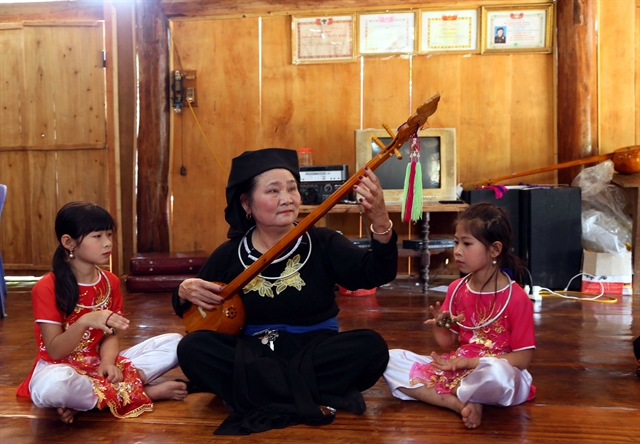 Society
Society

The practice, an intangible cultural heritage of humanity recognised by UNESCO and an essential part in the spiritual life of ethnic groups in Việt Nam, is familiar to local people.

|
| Hà Thị Mỵ, a health worker in Hamlet 5, Trung Trực Commune of the province’s Yên Sơn District, teaches her grandchildren to sing in then style. — VNA/VNS Photo Quang Đán |
TUYÊN QUANG — A woman in the northern province of Tuyên Quang is using traditional music to help local people understand more about the COVID-19 pandemic.
The 62-year-old Hà Thị Mỵ, a health worker in Hamlet 5, Trung Trực Commune of the province’s Yên Sơn District, has been using then singing practice to spread key health information.
The practice, an intangible cultural heritage of humanity recognised by UNESCO and an essential part in the spiritual life of ethnic groups in Việt Nam, is familiar to local people, particularly those from the Tày minority ethnic group, so Mỵ’s song with lyrics similar to the smash handwashing hit Ghen Cô Vy has become popular locally.
Mỵ said the COVID-19 song was not the first one she wrote new lyrics for in a then melody, for example, songs about family planning, nutrition and other Government’s policies.
“We usually sing those songs during meetings of residents in our hamlet,” she said, adding that people were excited to hear such songs and some even wanted to learn the songs.
There are 162 families in Mỵ’s hamlet, most of them from the Tày ethnic group.
Over the last 25 years, Mỵ has worked as the hamlet’s health worker who provides local people with not only medical aid but also advice and consultation on family planning, proper nutrition and disease prevention.
Mỵ said that when she started working as a health worker, she usually went to every house in the hamlet to tell people about the Government’s health policies.
She usually talked to women about family planning, nutrition for pregnancy and breastfeeding, vaccinations for children as well as how to keep their living environment hygienic.
“In the late 1990s, almost all people in the hamlet lived difficult lives, paying little attention to health care,” she said, adding that the hamlet was far from the commune’s and district’s health centres, which limited access to health services.
Mỵ said she and other local health workers usually visited local residents whenever a new policy was launched.
She composed songs after seeing people were more interested and engaged in listening to songs rather than long talks.
Local resident Hà Thị Thắm said that thanks to Mỵ’s instructions, she knew better how to look after her family.
“We are now paying more attention to hygiene, cooking food and boiling water. So we don’t get diarrhoea or rashes like previously,” Thắm said.
“When our health is better, we can work more and earn more,” she said.
Lương Tùng, head of the Hamlet 5’s residential group, said Mỵ helped local residents improve their health a lot.
For the last few years, all pregnant women and newborn babies in the hamlet were nursed at the commune’s health centre and all children were vaccinated, Tùng said, adding that people were aware of the importance of keeping the environment clean and hygienic.
Tùng also said Mỵ was a good example for other locals to follow as she overcame difficulties and worked hard to improve her family’s life.
Her husband is a veteran in poor health and when her children were young, Mỵ was the breadwinner but did not have experience or money to invest in farming.
After learning farming experience from other people in the district, she borrowed bank loans to grow wood trees, fruit trees and raise chickens and pigs.
Now, her family has nearly 8ha of forest, 1ha of grapefruit and raises more than 100 chickens and pigs. She earns about VNĐ200 million (US$8,600) yearly.
Mỵ said that to convince people to follow any policy, she must follow it first.
“When working as a health worker at the grassroots level, be patient and diversify the ways you communicate with people,” Mỵ said. — VNS




